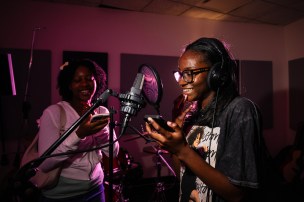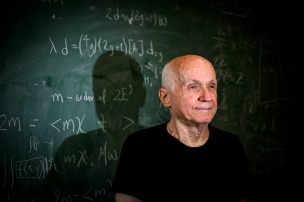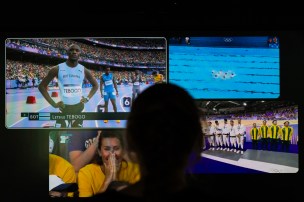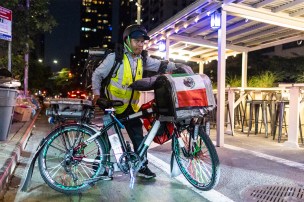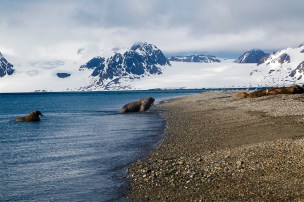Published on
Will Puerto Rico become a state? For one political science professor, it’s a personal question
Amílcar Antonio Barreto’s political education began in his grandfather’s ice cream parlor in Puerto Rico. Now, he brings his passion for his home country’s complicated politics to studying global nationalism.
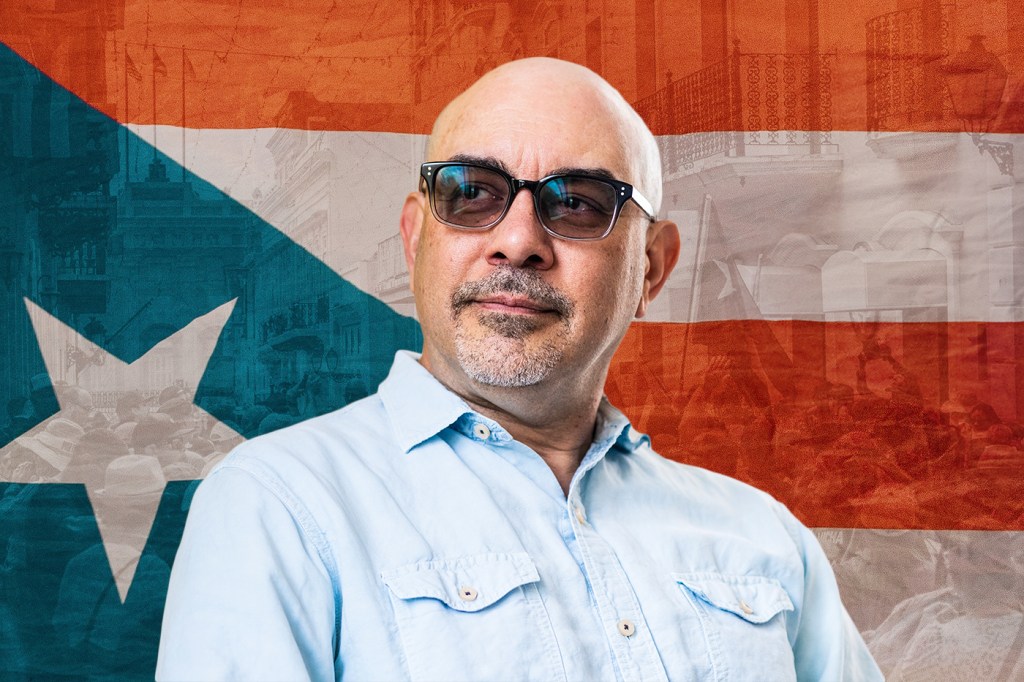
Amílcar Antonio Barreto’s political education began in his grandfather’s ice cream parlor.
That’s not on his CV. Officially, Barreto’s political education began at the Inter American University of Puerto Rico in San Juan. But once a month, while he was in college, Barreto would head to the little town of Lares, the cradle of the island’s independence movement.
Barreto’s paternal grandfather, an activist for Puerto Rican independence, operated an ice cream parlor on Lares’ central square. He plastered the parlor’s walls with pro-independence posters and pictures, including one of the revolutionary leader Pedro Albizu Campos.
“It was like a micro Puerto Rican pro-independence Disneyland,” recalls Barreto.
The ice cream parlor was also known island-wide for its bizarre flavors: corn, rice and beans, pigeon pea, lobster.
“He got into trouble with Puerto Rico’s internal revenue [service] because his rum raisin was basically liquid,” Barreto says. “People were enjoying themselves a bit too much with it.” Barreto’s favorite flavor—much more common in Puerto Rico—was parcha (passion fruit).
Barreto has relatives on all sides of Puerto Rican politics. His paternal grandmother (his grandfather’s ex-wife) was pro-commonwealth, in favor of Puerto Rico remaining a U.S. territory. She’d rebelled against her own father’s pro-statehood politics.
But in spirit, at least, the longtime Northeastern University political science professor takes more after his radical grandfather. From him, Barreto inherited a passionate critique of the status quo for Puerto Rico, the largest territory in the U.S. and home to 3 million people.
“Puerto Rico is in its worst crisis since the Great Depression,” Barreto said at a November 2022 talk on Northeastern’s Boston campus with Juan Dalmau, the Puerto Rican Independence Party’s most recent candidate for governor. “Economic decline, social unrest, and brain drain are now the order of the day.”
Barreto is often quoted in the press about debates over Puerto Rican statehood (he thinks it’s unlikely) and known on the Boston campus for his popular course on nationalism. And he’s got three book projects in motion: one on Christian nationalism in the U.S., one on the rise of the alt-right, and one on what he calls Puerto Rico’s “golden half-century,” from the 1940s to the 1990s. He argues that the U.S. government cared more about Puerto Rico then than it does today.
“It’s going to be painful,” he says of writing the latter. “And I may have certain relatives that won’t speak to me anymore.”
The “golden half-century”
During lunch at Vejigantes, the Puerto Rican restaurant a mile’s walk from his office, Barreto says he’s not a frequent customer. “I have not been here in a long, long time,” he says. “I invariably compare it with grandma.”
Born in Puerto Rico, Barreto moved to the mainland U.S. with his parents when he was 5. When he returned to the island for college, he lived in San Juan with his grandmother, who spoiled him with home-cooked meals. By comparison, lunch at Vejigantes (mofongo, a mashed plantain dish, and alcapurrias de jueyes, or crabmeat fritters) was “not bad!” Barreto declares. “The flavors were mostly there—but if you’re making mofongo in Puerto Rico, you probably picked the plantains that morning.”
After undergrad, Barreto earned three degrees from the State University of New York at Buffalo: a master’s and doctorate in political science and a law degree. He’s taught at Northeastern since 1996.
Since then, his research interests have expanded to political issues that impact the globe. But his third book will mark a return to his roots, chronicling “the approximately 50-year period when the federal government actually cared about Puerto Rico,” in his words
During the Cold War, the U.S. government wanted to discourage Puerto Rican nationalist violence and make the island into “Uncle Sam’s so-called showcase for democracy” in Latin America, Barreto says. So it granted Puerto Rico more self-governance, spent heavily on developing the island, and used tax breaks to encourage companies to locate businesses there.
But the golden half-century book won’t be a happy book, because Barreto will also cover what happened after the era ended.
“By the end of the Cold War, Puerto Rico no longer held the same value to Washington,” he says. Between 1996 and 2006, the U.S. Congress phased out the corporate tax break that Barreto calls “the backbone of Puerto Rico’s economy.” The island has never recovered, he says.
“One by one, factories closed,” Barreto recounted in his November 2022 introduction to Dalmau’s Northeastern appearance. “They packed their bags, as did many college-educated Puerto Ricans. The island’s tax base was shrinking. Its debts were mounting. Puerto Rico could no longer afford basic maintenance of its aged electrical grid.”
In 2015, Puerto Rico’s government announced that it was no longer capable of servicing its debt. “Washington responded not by helping, but by stripping the commonwealth of its fiscal autonomy,” Barreto said. In 2016, Congress passed a bankruptcy law for Puerto Rico. It created a fiscal review board, appointed by the U.S. president, that now controls Puerto Rico’s government finances.
The law’s supporters credit it with restructuring Puerto Rico’s debt and allowing the island to emerge from bankruptcy in 2022. But Barreto and other critics argue that the fiscal review board has taken away the self-governance that Congress granted Puerto Rico in 1952. “This has become the 21st-century’s version of the old governor generals in the British Empire of yesteryear,” Barreto said at the November talk.
‘Everything about this course is controversial’
The “golden age” book project will be a homecoming of sorts, a return to Barreto’s longtime focus on Puerto Rican studies after an interlude focusing on nationalism. Northeastern initially hired him to teach Latino politics in the U.S., but as student demographics changed, interest waned.
“On the other hand, students seemed very interested in my nationalism course,” he says. He thinks it’s because today’s typical Northeastern student has a wider range of global interests—and because students like controversy.
Barreto’s syllabus defines nationalism as an ideology that aims to “reconstitute the sovereign state along ethnic lines.” The class focuses on conflicts over ethnic, religious and national identities. “Everything about this course is controversial,” Barreto says.
Nabil Nasser, a Northeastern senior majoring in international affairs and sociology, says the class has been one of his favorites at Northeastern.
“The way he did it was so engaging,” Nasser says. “The most important thing about having a professor do something well is to be passionate about what they’re teaching. I think he’s extremely passionate.”
Nasser says Barreto’s passion came out in his examples of “how someone’s nationality is very subjective,” including people Barreto knows who “idealize and cherry-pick their own DNA.” They stuck with Nasser: “Latino people referring to themselves as French if 20% of their ethnicity is French,” the student recalls, or someone with a tiny amount of Scandinavian heritage who’d “say they’re half Viking.”
Many of Barreto’s nationalism students have been galvanized by the class enough to co-author papers with him. A Saudi student co-wrote a paper with him on Muslim radicalization in the U.S. He and a South Korean student co-wrote a paper on why some conservatives in South Korea and the U.S. fly the Israeli flag at their rallies. (They argue it’s the protesters’ way of expressing a Christian nationalist desire for “biblicality”—their hope that South Korea and the U.S. become religious nations like Israel.)
And Barreto and Nasser plan to work together on research about Lebanon, Nasser’s home country. “We’re trying to highlight how Christian groups and Muslim groups view Lebanon,” Nasser says. Many Lebanese, he adds, identify more strongly with their religion than with their multiethnic country.
He’s also working on a book project about Christian nationalists in the U.S.—people who believe, he says, “that ultimately, the United States was founded as a Christian country, despite freedom of religion, and that Christian principles should be the guiding force of American public life.”
The book will argue that Christian nationalism isn’t best understood by reading the work of clergy, but of political activists who aren’t religious figures, such as Pat Buchanan, the former Richard Nixon aide and repeat presidential candidate in the 1990s. “This group was behind the Trump movement before anybody else,” Barreto says.
The epicenter of Puerto Rican politics
The concept of “nationalism” of course, takes on an even messier dimension when it comes to Barreto’s home island. Puerto Ricans have been U.S. citizens since 1917, but the island’s 3 million residents don’t have a vote in Congress and can’t vote for president. For decades, Puerto Rico’s relationship with the U.S. has dominated its politics. A pro-statehood party and a party in favor of the island’s current commonwealth status have faced off in closely competitive elections, with a pro-independence party far behind.
Barreto’s 2020 book, “The Politics of Language in Puerto Rico Revisited,” digs into the role of language in the island’s party system: how the pro-commonwealth party stresses the Spanish language as central to the island’s identity—it even briefly abolished the island’s official bilingualism in the early 1990s—while the pro-statehood party encourages bilingual education.
Whatever their politics, Barreto’s book suggests, Puerto Ricans see the Spanish language as a central part of their culture. He argues that this hurts the cause of Puerto Rican statehood because in past debates about the island’s status, some members of Congress cited the Spanish language’s predominance on the island as a reason not to admit it as a state.
Meanwhile, Puerto Rico is becoming less bilingual and more Spanish-speaking as Puerto Ricans who speak English move to the U.S. mainland. Between 2000 and 2017, the percentage of Puerto Ricans who speak only English dropped from 14% to 4%; the percentage of Puerto Ricans who speak Spanish and also “speak English very well” dropped from 28% to 17%.
“Here’s one of the paradoxes of American national identity,” says Barreto. “The founding generation used ideology—we are the people who believe in liberty, democracy, egalitarianism—to separate the American ‘us’ from the British ‘them.’ But that was never applied to this country’s Black population. It didn’t apply to Native Americans.”
That tension between an American identity built on ideas versus an identity built on race, ethnicity, language and religion still exists, he argues. “The public face of the identity is ideological, which means universal, open to all,” he says. “But go inside, and the racial, ethnic side of American identity is still there.”
That’s why Barreto thinks his next book on Puerto Rico will upset many Puerto Ricans, including members of his own family. “A lot of Puerto Ricans see themselves as white, and can’t accept that in the U.S., they’re seen as brown,” he says. “I’m telling them that whiteness is not permanent; it’s based on geography.”
The majority of Puerto Ricans would like to be more fully included in the American identity. In a 2020 election, 52.5% of Puerto Rican voters said “yes” to becoming a state. In December 2022, the U.S. House passed a bill to allow Puerto Ricans to choose statehood, independence or a renegotiated “free association”—but the Senate didn’t take it up before the session ended. Many Democrats are interested in admitting Puerto Rico and Washington, D.C., as states, arguing that it will help balance out the clout of small rural states in the U.S. Senate and Electoral College.
Still, Barreto doubts statehood will ever happen.
“Some people still fantasize about resolving the status question,” Barreto says. “Nothing’s going to be resolved or settled anytime soon.” One reason, he says, is that Puerto Rico has only recently exited bankruptcy. But another reason is where the true decision-making lies.
“This is extremely controversial, what I’m going to say, but I say it as a political scientist,” Barreto says. “The epicenter of Puerto Rican politics has been, throughout the 20th century and into the 21st, our status: What are we vis-a-vis the U.S.? But what Puerto Ricans prefer doesn’t matter. The only opinion that counts is the U.S. Congress. Congress has complete control over the territories and can do whatever it wants.”
Barreto is a cautious commentator about Puerto Rican politics, given its passionate, contentious focus on identity. “I’m generally very careful and dance around certain political questions,” he says.
Still, he gets excited talking about his pro-independence grandfather. He’s clearly unhappy with Puerto Rico’s current status; he often refers to the island as a colony of the U.S. So is he pro-independence?
“I’ve had, I think because of my family, some sort of soft-core sympathies for the pro-independence movement,” Barreto says. But, he adds, “As a scholar, I realize that Puerto Rico’s status is not going to change. And it’s not going to change because Congress doesn’t want us to change.”
“So the political activist would say, I favor this, and do so emphatically. The scholar in me says it doesn’t matter what we think.”
Erick Trickey is a former Northeastern Global News Magazine senior writer. Follow him on Twitter @ErickTrickey.


